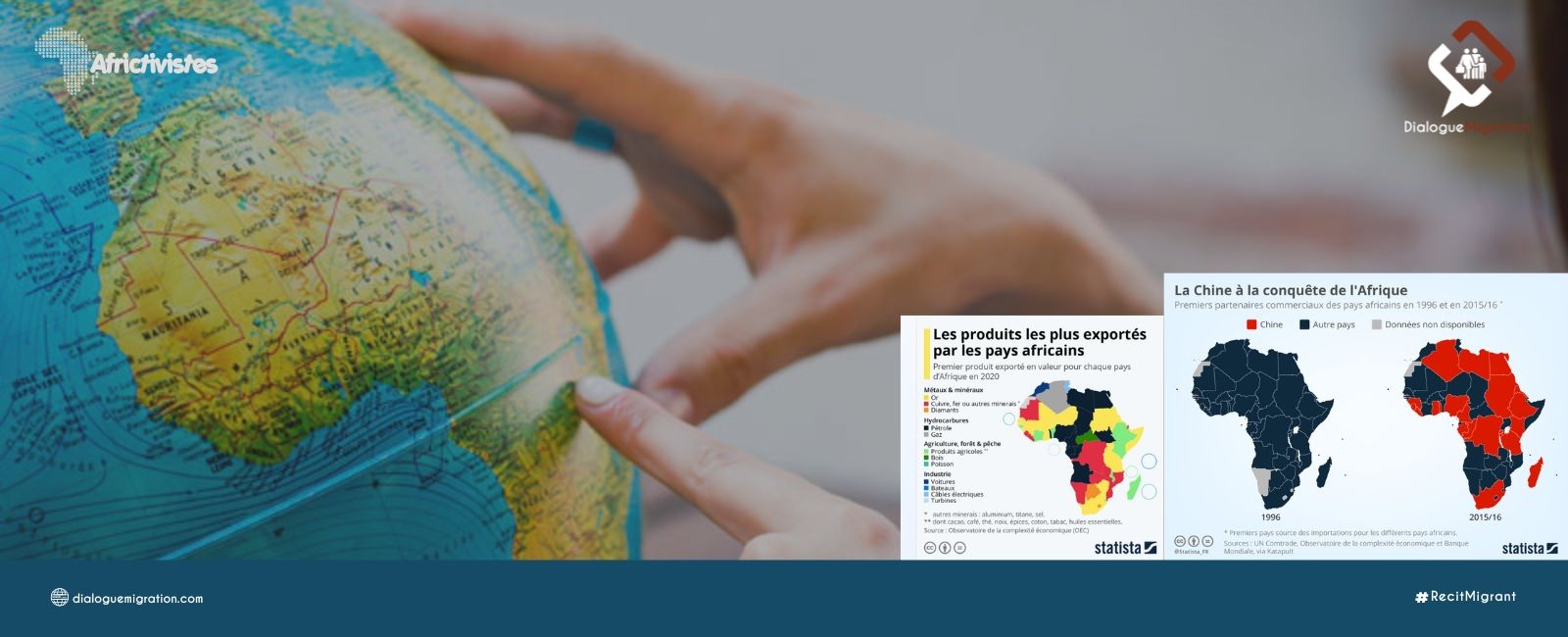

The movements of people, from one point to another on the globe, increasingly follow the path of natural resources. In the latter area, Africa is one of the parts of the world best endowed by Mother Nature. It is a continent with a very rich subsoil in vital elements for the economies of developing countries. Diamond, gold, manganese, bauxite, oil, gas, zircon, uranium, iron, copper, fish products… arouse the increased greed of Western powers, seeking by all means, to grab land, mineral deposits, sources of energy and raw materials. Globally, it was estimated that in 2020 Africa accounted for 40% of gold reserves, 30% of mineral reserves and 12% of oil reserves, according to the French statistics and data agency, Statista.
The rush of these foreign multinationals to the “green African grasslands” is a facet of migration that is not often shown in the media. And yet, on closer inspection, if African states had put in place effective policies to protect their subsoil from abuse and inequitable revenue sharing, the majority of populations would not need to seek better living conditions elsewhere, in the oceans and deserts. “The abundance of poorly exploited natural resources fosters underdevelopment and poverty in Africa. They are sold at prices set by developed countries. There is a real challenge to good governance of natural resources in Africa to lift the population out of underdevelopment,” says Senegalese economist and consultant-coach Mouhamadou Ba.
According to this academic contacted by Dialogue Migration, “Africa is a continent where financial capital is lacking: it is a continent where the population is not only dense but increases from year to year, unlike the Western population which is aging. The density and emergence of the African population makes it a market where goods and services can be sold, labor can be found there. On the other hand, the potential for free resources is enormous: arable land, water, oil, gas, gold, silver, etc. The impossibility of living in autarky and specialization also pushes multinationals to migrate to areas with great economic potential to benefit from the economic opportunities that are present there.
Thus, “the movement of multinationals towards Africa is explained by the fact that the African continent is a potential market, a geographical area endowed with free resources and unusable economic resources for profit, i.e. an ineffective and inefficient use. But companies, whether large or small, national or foreign, have a single goal: the search for profit through income-generating activities and the African continent remains a profit market.”
Weak governments
In an interview with the United Nations Africa Renewal website, Dr. John Mbaku, a researcher with the Brookings Institution’s Africa Growth Initiative and professor of economics at Weber Public University in the United States, said: “If your leaders are weak or corrupt, you will have no power nor the ability to negotiate a partnership in your favor. You will inherit a PPP (Public-Private Partnership) that is not a partnership.”
Mr. Mbaku gives the example of oil companies that have been operating in Africa for more than three decades but still employ expatriates rather than locals. These companies are reluctant to share their skills, knowledge and technologies.
An intense war of economic positioning of the great powers
Though not new, the great Western powers’ rush to Africa has taken on a new form. A kind of economic imperialism seems to best describe the nature of the relations between these powers whose multinationals exploit the resources of countries of the African continent, according to our economist and consultant-coach. “It is the South, particularly the countries of Africa, that provides the development resources of the North. Imperialism (old and new) implies misfortunes for the whole of Africa: underdevelopment and chronic poverty. The new form of imperialism is the licit exploitation of natural resources in the form of contracts disadvantageous to the continent and the mis-exploitation of natural resources,” said Mr Ba of Gaston Berger University.
He adds: “From the 14th century to the present day, there has been an evolution of international economic relations. Indeed, since the 80s, the emphasis has been more on capital movements than on trade. Companies are set up in geographical areas where inputs or factors of production are easy to find with their strong financial and technical capital. They are also oriented in areas where production is easy to sell. They are all oriented towards markets where there is great profit potential,” explains our interlocutor.
The United States, France, China and Russia are intensifying their economic and influence tussle in Africa, including tours of the continent, summits and forums, contracts between public and private companies or development projects.
U.S. Vice President Kamala Harris, U.S. Secretary of State Anthony Blinken, First Lady Jill Biden, Treasury Secretary Janet Yellen and Ambassador to the United Nations Linda Thomas-Greenfield have visited at least 12 countries on the African continent in just three (3) months. Never seen before!
To respond to the United States, China sent its new foreign minister, Qin Gang, for the traditional Africa tour at the beginning of the year. Accused of developing a predator strategy on raw materials in Africa, China declared, through its envoy at the African Union headquarters in Addis Ababa, that “Africa should be a stage for international cooperation, not an arena for major-force rivalry.”
In addition, France and Russia have been engaged in a very intense influence tussle on African soil in recent years. “Initially purely political, this international rivalry took a strong economic anchor after the Great Powers noticed the discreet rise of the Chinese within African economies via their companies,” notes La Tribune journalist Ristel Tchounand in an analysis of the conflicts between Western powers on African soil.
We must not forget the increasingly imposing presence of India and its companies that are active in the exploitation of iron and other minerals. In addition, at the end of March 2023, India presented a series of military equipment (helicopters, drones and artillery pieces) to the authorities of 31 African countries in Pune (a western city and stronghold of the Indian military industry). The major advantage of this new partner in this specific field is that the cost of its armament is much lower than that of the other powers.
What drives foreign powers to migrate to Africa
The media do not treat this implantation of the major Western powers, through their multinationals and other military bases in Africa as migration. But based on the United Nations definition of the term “Migrant”, all these countries and their representatives can be defined as such. Indeed, according to the UN, a migrant is, “any person who has resided in a foreign country for more than one year, regardless of the causes, voluntary or involuntary, of the movement, and regardless of the means, regular or irregular, used to migrate”.
This movement from the West to African countries is guided by natural resources. “Among these poorly exploited natural resources, we can rightly mention gold and oil. Nigeria, Ghana, Côte d’Ivoire and Niger are the main countries with significant operating reserves: Nigeria (about 2.25 million barrels per day), Ghana (120 000 barrels per day), Côte d’Ivoire (50 000 barrels per day) and Niger (20 000 barrels per day). Oil is the main item in the region’s trade transactions,” says economist Mouhamadou Ba.
“West Africa generates more than 27% of Africa’s iron ore production and the richest iron deposits (over 65%) are held by Guinea and Liberia. Burkina Faso, Côte d’Ivoire, Ghana and Mali are producers of very high-grade gold. Moreover, in 2006, gold mining is estimated in Mali at 15% of gross domestic product (GDP) and 70% of export earnings in Burkina Faso (gold exports) are estimated at 180 billion CFA francs in 2009, which puts this sector ahead of cotton, which represented 120 billion CFA francs. Also, more than 34% of the manganese produced by Africa comes from West Africa.”
Today, it would be impossible to draw up a comprehensive list of all the foreign countries present in one way or another on African soil. From the exploitation of natural resources to trade and the establishment of strategic military bases. But Africa is the land most coveted by the great powers and their multinationals. A form of migration that is not often seen as such in the media narrative dealing with the issue.


